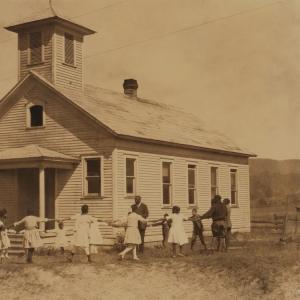
Jay Wamsted is a high school math teacher in southwest Atlanta. He writes about race and is working on a book about school segregation and the legacy of Jim Crow education.
Posts By This Author
Forgiveness Is Not the Easy Way Out of Racism
Many white Americans want racial reconciliation to be like Borges’s legend. Like my relative’s friend, they want race and racism to be “over.” They think that Black and indigenous populations should forget that we stole their land and their bodies, made ourselves rich off their goods and their labor. After all, most white people have forgotten these facts. Slavery and manifest destiny are in the past, they protest; the civil rights movement has guaranteed equality for all — it even led to a black president. Instead of listening and entering into dialogue — the true beginning of reconciliation — they square up in the kitchen and declare racism “an excuse.”
What Do I Tell My Son About School Segregation?
How do I explain this to Simon, the fact that large-scale neighborhood segregation too often goes hand in hand with economic deprivation. How do I tell him that it’s not that white people aren’t allowed, it’s that they are exercising their power to opt out? That Brown v. Board could only open school doors for black students, that it couldn’t keep white students from walking away? In other words, how do I explain the legacies of slavery and Jim Crow to a young child?
How Racism Wins
TO MOST WHITE AMERICANS living today, racism has—until recently—managed to keep itself somewhat hidden. For decades, white people perpetuated the myth of an unbiased meritocracy, lauded laws that officially criminalized segregation and discrimination, embraced a token form of multiculturalism, and accepted a tincture of color in their overwhelmingly white world of power.
When Martin Luther King Jr. was assassinated, the United States tipped but didn’t topple. Klan Wizard David Duke ran for national office several times but never won. Two generations after the Civil Rights Act of 1964, the country elected a black president. For 40 years, if you believed you were white, you could act as though the lie of skin superiority was largely a relic of the past.
Racism and white supremacy sold the same lie the devil wants told about all manner of evil: Look at the light; there is nothing in the shadows. All is well, move along.
We know the sentiment better, perhaps, from the 1995 film The Usual Suspects, in which it is said, “The greatest trick the devil ever pulled was convincing the world he didn’t exist.” The poet Charles Baudelaire, however, first came to this idea in his prose poem “The Generous Gambler.” The narrator of the 1864 poem spins a tale of an evening spent with the devil. They drink and gamble, the devil wins, and the narrator loses his soul. The night ends with the narrator alone in his bed, begging God for mercy.


